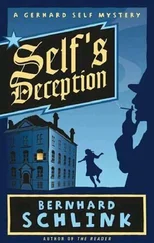ALREADY BY THE NEXT DAY living together had become oddly routine. It reminded Georg of their last days together in Cucuron.
“What were you thinking, when from one day to the next you didn’t come back? Without a word?” Georg saw the pale blue morning sky through the venetian blind. Françoise lay exhausted and satisfied beside him, her head on his arm.
“Joe sent me to New York and told me to stay here.”
“But what were you thinking, I mean about me, about us?”
The strain of her concentrating was visible. She didn’t understand his question, but wanted to do the right thing: not disappoint him, but satisfy him with the proper answer.
“Don’t think so much,” he said. “Just tell me what happened.”
“It was my job. And Jill was on the way, and you were beginning to act crazy. I couldn’t risk my job, because I soon would have to provide for Jill and couldn’t rely on you anymore. You’ve always been… you always want more, and keep doing things that ruin what you have. In Provence, at any rate, you ruined everything with your pride and stubbornness. You just had to quarrel with Joe. In life you have to be content with what you’ve got.”
“That’s ridiculous.”
“You see? You don’t understand.”
“Aren’t you getting any support for Jill?”
“No, I don’t know who the father is.”
“Benton or your ex… Might she be mine?”
She raised herself on her elbow and looked down at him.
“That’s sweet. Sometimes I wished it. How you were in my mind when I was walking along Madison Avenue and a man ran in front of me who was wearing your aftershave, and I ached with longing.”
“And later, when Benton came back to New York, he told you that he had finally got the better of me, bought me out?”
“Yes.”
“Do you want to know what really happened?”
“Not now. Jill will be waking up in a minute.” She pushed the blanket away and kissed his chest.
Georg spent most of the day alone with Jill. Fran, as he now called her, was finishing her new translation at NYU. He called Helen, who had been given an appointment at Townsend Enterprises. He played with Jill, fed and bathed her. He read around in Fran’s books and systematically went through her closets, the boxes under her bed, and her desk. He found out that she was thirty years old, came from Baltimore, had gone to Williams College and Columbia, and had been married for six years to a David Kramer. In a drawer he found a photo of himself; he was lying in the hammock in front of the house in Cucuron, with Dopey on his stomach. When Fran came home at six, dinner was on the table.
The following days passed the same way. Evenings and mornings, when they had slept together and Fran was purring with satisfaction, Georg got occasional answers to occasional questions. She had hung up the picture of the cathedral in Cucuron because when she had been a student, she had lived across the street from the cathedral and had been happy and wanted something to remember New York by. Yes, Townsend Enterprises was owned by Joe Benton. He had gotten around in the world, first as an Orthodox priest, then with the U.S. Marines, and then in an ashram in California. When he became a private detective, at first he had worked under his own name. But as his commissions got riskier and his clientele more well known, he had to assume disguises. Fran had worked for him for four years, and had become his lover in the second year. The commission for Gorgefield Aircraft was the biggest she could remember; it brought Joe thirty million. She was sorry it had cost Maurin his life, she said. But Georg had the impression that she didn’t care, and that she was somehow making him responsible for the attack on him and the death of his cats. Joe had connections to official authorities. “One hand washes the other, you know. Sometimes he needs the officials, and sometimes they’re happy to have a problem disposed of unofficially. CIA? No idea whether it’s the CIA or one of its offshoots.”
Politics didn’t interest Fran. So she wasn’t interested in the political dimension of her work, let alone the moral dimension. But, Georg asked himself, am I any different? I told Helen that for Benton/Bulnakov it would mean a defeat to pay me money, and that this defeat was what mattered to me. But what did I want to do with the money? Punish and avenge myself and cash in-I made it pretty easy for myself.
Nevertheless, the question remained what really interested Fran. Her job? She seemed to have an obsequious relation to her work; the obsequious relation to Benton had been part of it. “Did you love him?”-“He wasn’t bad to me. I have a lot to thank him for, he even wanted to pay for Jill.”-“Why didn’t you let him?” Georg wanted to hear her answer. Her submissiveness reminded him of the fatalism with which one submits to the weather, come rain or shine. So she could have taken Benton’s money as a gift from heaven. But no. “I can’t do that, because I don’t know whether he’s the father.” She seemed surprised at his strange question, morally surprised. So the theory about the weather was out. Still, the job for her was just a job, just like the weather is only the weather; it left her uninvolved.
Jill? Fran’s life revolved around Jill. At the same time, Georg saw that in dealing with Jill she was strangely businesslike; Jill was a practical problem requiring practical solutions. When Fran breastfed her it was a technical procedure of providing and receiving nourishment. There was no mother-child intimacy. Georg recalled paintings in museums that radiated more warmth than the sight of Jill at Fran’s breast.
And me? Is she interested in me? Does she love me? Georg often had the feeling that for her he too was a piece of the world that one can’t change, that one had to accept, happy when he was happy, and bending under his blows. Every day she was happier with him. He noticed it. And why not? He took care of Jill, cleaned up and cooked for Fran, and slept with her. When she had her orgasm, when cries burst from her and she held on to him tightly-Now, he thought, now I’ve gotten through to you, shaken you. But when afterward she stretched out, she reminded him of a dog eagerly splashing through water and shaking itself dry, the drops spraying all around. He had not gotten through to her, shaken her, but was simply one of the pleasures the world offered.
Sometimes he wanted to grab and shake her. As if there were another Fran in the Fran he was with, as if he could break through the shell in which she, whether happy or sad, seemed uninvolved and unreachable: to hack his way through the hedge of roses and shake the sleeping princess awake if he couldn’t kiss her awake. He knew the feeling from Cucuron. Once, leafing through Helen’s books, he had come across the fairy tale of Sleeping Beauty . He knew that the king’s son who kissed the sleeping princess awake had simply come at the right time. The hundred years had passed, and the day had come when she was to awaken again. Sleeping Beauty is not to be awakened simply by a kiss.
Once Georg did grab Fran and shake her. It was on a Sunday, and for the first time she hadn’t gone to the library to translate, but spent the whole day with him. They took Jill into their bed, and the three of them bathed in the bathtub. They had Bloody Marys and eggs Benedict for breakfast, and read their way through the thick Sunday Times . At two, the phone rang. Fran picked up, said “yes” and “fine” and “till then.” At three she began saying that Sunday together was lovely, but she wasn’t used to their being together so much. She needed her space, and time to be alone. He agreed, and went on reading. She asked him whether he didn’t feel that way too, and whether he wouldn’t like to go out for a few hours.
Читать дальше












